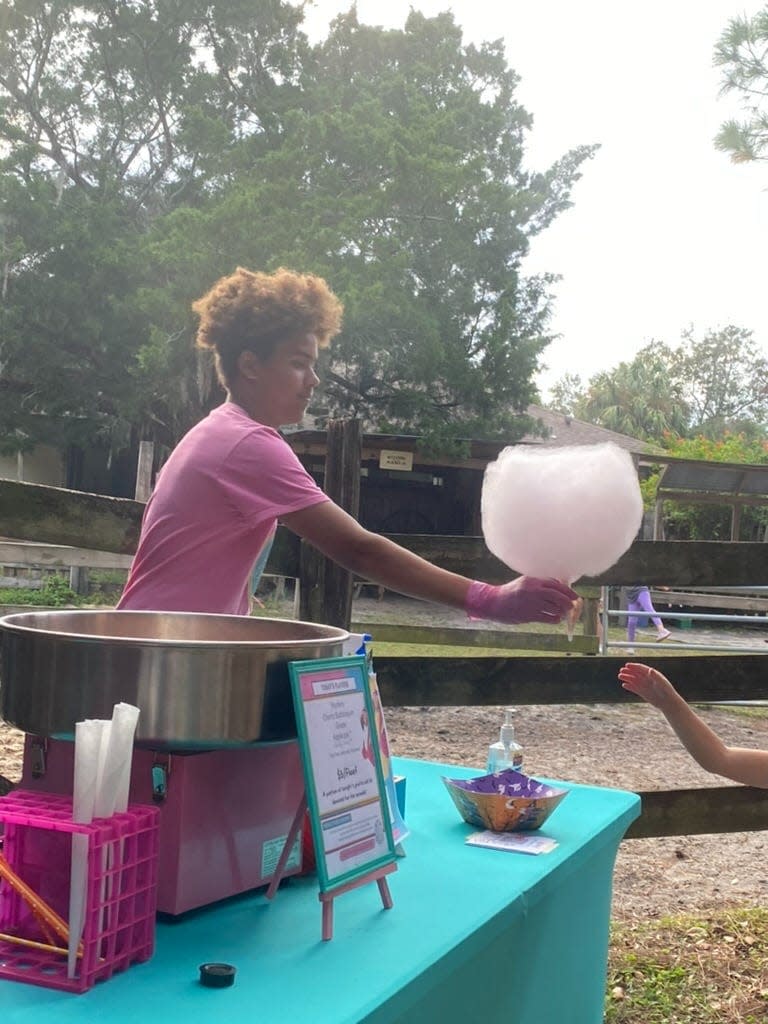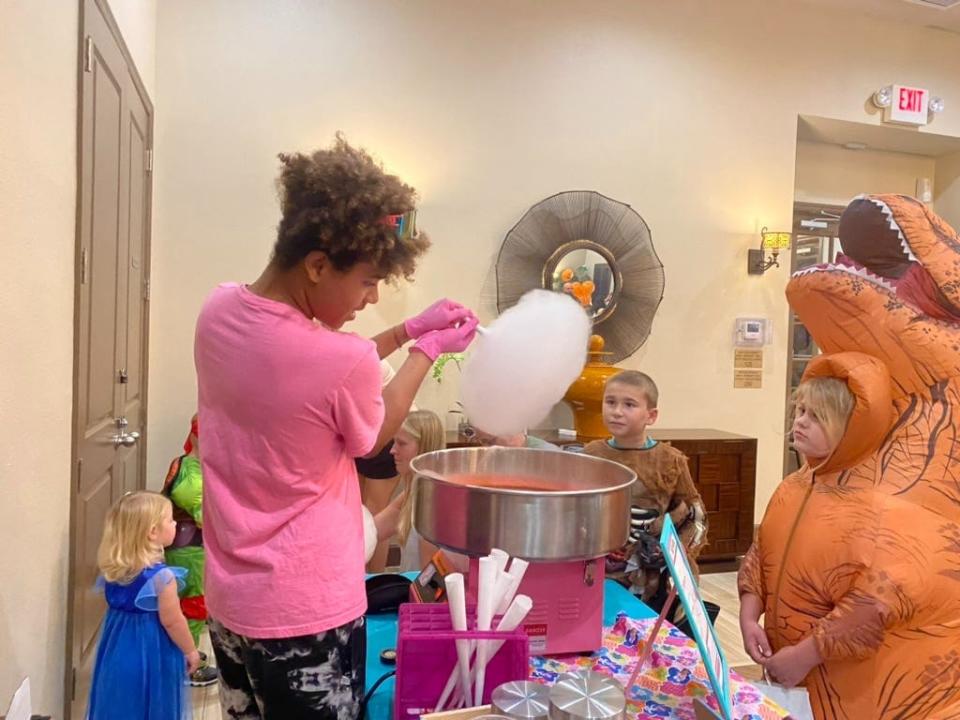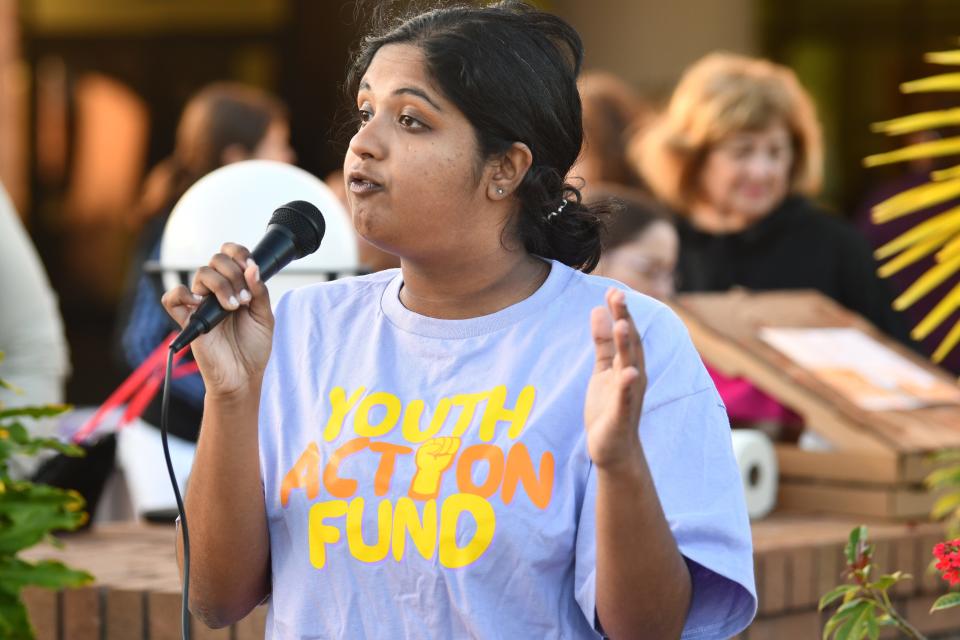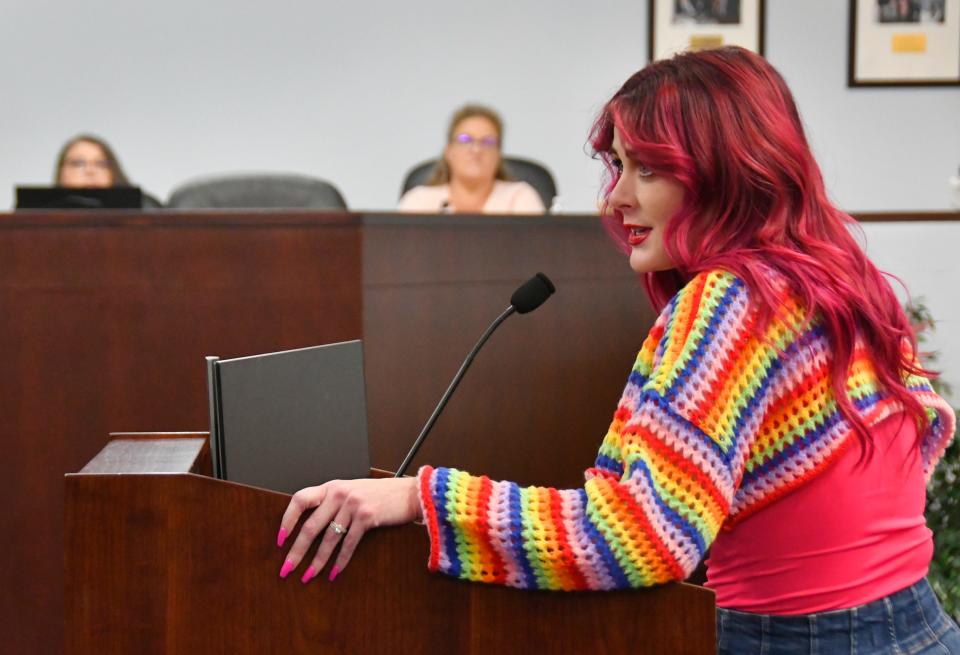Cotton candy to mental health to politics: Brevard residents debate pros, cons of TikTok
Over the past six months, Levi Draheim has found a passion for creating cotton candy.
It isn't just locals he shares his sugary creations with: The 16-year-old Melbourne resident posts about his candy creativity on social media, sharing video clips of his different flavor combinations for his business, Flamingo Floss Florida. He's even made short tutorials on how to fix parts of his cotton candy machine.
Though he uses multiple social media platforms, TikTok is by far his favorite, Levi said, as he appreciates the short format of the videos and the diverse audience on the app.
"Being able to share what my business is, (is) something that I really care about, because that helps me to make sales, it helps me to be able to connect with new customers," he said.
Whether they're promoting a small business, engaging in activism or just looking to connect with others, Space Coast residents of all ages have found a space for community on TikTok. But that platform may potentially go away by early next year amid congressional fears about the Chinese government's influence over the Chinese-owned company.
On Wednesday, President Joe Biden signed a measure that would ban TikTok from operating in the United States or force the app's Chinese parent company ByteDance to divest or sell the app by January of next year. The measure received bipartisan support over the weekend in the U.S. House and in the Senate early in the week.
In Florida, teens are facing additional barriers to social media under a new law that bars anyone under the age of 14 from creating a social media account, and requires that 14- and 15-year-olds get parental consent before creating an account. The law, signed in March, goes into effect in January 2025.

While the TikTok ban comes amid concerns that TikTok would have to hand over U.S. users' data to China if asked, critics have raised concerns about the potential ban and freedom of speech.
"Free speech is not just people talking or writing, but it also involves the technologies that are used to facilitate communicating ideas," said Aubrey Jewett, a political science professor at University of Central Florida. "A ban on TikTok is basically a ban on a type of social media, one specific type of social media, and it likely would not stand."
One view: TikTok ban would stifle creativity, small businesses
Levi isn't the only member of the Draheim family using TikTok as a way to promote a business.
Leigh-Ann Draheim, Levi's mom, uses the platform for her custom kids' clothing business, Sew Yeti. She makes videos showing her whole process, from her initial idea to how the custom clothing piece turns out, and even sometimes creates sewing tutorials.
"Neither of us make money off of (TikTok)," she said. "But it's definitely a useful tool to share things."

Both mother and son use other forms of social media, like Facebook and Instagram. But the range of demographics they can reach on each platform varies, and Levi prefers TikTok. If he lost access to it, he thinks, he would be missing out on a core audience group.
"It's a lot of young people that are on TikTok," he said. "So I would be missing out on that group of people —sharing my content to that group."
Draheim, who shares her son's content on Facebook with other moms, echoed that sentiment: "He goes, "Mom, nobody my age uses Facebook, they're all on TikTok,'" she said.
While Draheim is comfortable on multiple platforms, it's TikTok's in-app editing software that makes it special, she said, adding that she's attempted to use YouTube in the past and found it tedious.
"If I needed to delete a portion of the video or add subtitles or whatever, I found it super annoying to do so," she said. "Whereas TikTok, I could figure out almost immediately — it's very easy to use and intuitive."
Not all in favor of the TikTok app
Not everyone views the popular app so favorably.
Crystal Kazy, a Brevard mom of two teenage boys, said her sons were both previous TikTok users. However, she had them both delete the app about a year and a half ago after concerns were raised about the Chinese Communist Party potentially having the authority to access user data.
"I disagree with a foreign government collecting data on our minors, and the fact that the United States has no control over a foreign entity later using that data for whatever purpose they deem necessary for their own uses," Kazy said.
Kazy, a former flight attendant of 18 years, said she trusts the government has information that hasn't been revealed to the public about the potential threats TikTok could pose to the country. Because of that, it's enough for her to not want her kids accessing the app, and she worries about how current data collection could impact kids who want to work in high-security government jobs in the future.
"All I need to hear is that it potentially could be a national security threat," she said. "If our government has investigated that, they have information they're not going to disclose to you or me. So we have to trust that, and if they're sounding the alarm, and it's a bipartisan issue ... I think the general consensus of the United States public would assume that there are good reasons for that."
Risks of data collection aren't the only concerns raised about TikTok. During Florida's legislative session, the impact of social media on teens was discussed prior to the passage of HB 3, with Rep. Fiona McFarland saying the new law would shield children from "digital fentanyl" and social media addiction.
Rep. Tyler Sirois, another cosponsor of Florida social media bill and father of two, brought up concerns about TikTok creating a national security threat to the United States.
"This is a company that is being used to monitor the American people," he said.
Congressman Bill Posey, who voted in favor of the TikTok ban, shared a similar concern, though he clarified that the bill doesn't automatically ban the app, but gives ByteDance the option to "break up with the Chinese Communist Party."
"It’s TikTok’s choice and Americans should be concerned about the Chinese Communist Party’s control and influence over the app, it’s data collection and surveillance capability," he said in a statement to FLORIDA TODAY.
Social media's impact on mental health
Sirois is also worried about TikTok's impact on mental health, telling FLORIDA TODAY that it had "addictive features."
"That's infinite scroll, autoplay, personal interactive metrics," he said, adding that girls are disproportionately impacted.
"When you see rates of hospital admissions for self-harm, when you see rates of depression or anorexia and other eating disorders, there really is a compelling state interest for us to step in and protect our kids."
Social media's impact on teens is a mixed bag, according to Vida Tyc, chair of Florida Tech's clinical psychology program and director of clinical training.
"The original need that teens do this for is social," she said, adding that social media can provide connection especially for those within marginalized groups. "But then kids kind of wander into more harmful content."
Tyc, a licensed psychologist who worked with kids at St. Jude Children's Research Hospital for 24 years before becoming a professor at Florida Tech, said some of the benefits of social media include opportunities for connection, the ability to learn about current events and a place for self-expression.
The downsides can include higher rates of anxiety and depression, sleep disruption, decreased physical activity and more.
"Some kids are going to be more vulnerable than others because of their strengths or their vulnerabilities, their intellectual development, their ability to comprehend risks and even the home setting that they come from," she said. "All of these things come into play into terms of how different kids respond to that online experience."
There are numerous ways kids and their parents can work to stay safe on social media, she said, from limiting time on social media and avoiding negative content to opting not to use smartphones at all and making sure to communicate with one another about digital literacy skills.
"It's kind of teaching (kids) to be aware of, 'These are the warning signs, these are the danger signs and these are the things that you should not engage in,'" Tyc said. "Parents can play a role in that, schools can play a role in that, communities can play a role in that."
Censorship concerns over social media bans
Jewett believes a national ban on TikTok and Florida's own social media restrictions won't stand up in court, saying they're too broad and violate people's First Amendment rights.
"We have seen similar laws in other states ... that were declared unconstitutional, or at least have had injunctions filed so they couldn't go into effect until the trials were completed," he said, referring to Montana's attempt to ban TikTok in 2023, and Arkansas and Ohio's attempts to limit minors' access to social media.
"Minors are people too, and they have free speech rights, and the government is not allowed to take those away except under the most limited circumstances and for the most compelling reasons," Jewett said. "And even when they have a compelling reason, they have to find ... the least restrictive way of fulfilling that reason."
In Texas, a federal judge allowed a ban on TikTok to go into effect last year, but its scope was much narrower, Jewett said, as it only banned the app from state-issued devices and state networks.
"The case is a good recent example of a free speech restriction of social media that withstood court scrutiny because it was considered to be reasonable and narrowly tailored to resolve a particular problem," he said, referring to the concern that the Chinese government could access secure information.
Seventeen-year-old Anjani Sharma, a senior at West Shore Jr./Sr. High, is the founder of Minds Without B0rders, an international youth-led nonprofit with a focus on destigmatizing mental health. Last year, the group used TikTok to recruit members to the organization through "fun, relatable TikToks," she said.
"We got a pretty good following, a good base," she said, adding that they posted everything from information about the group to tips on improving your mental health. "A couple of our leadership team (members), we found off of TikTok — that's kind of how we were able to actually grow."

While Anjani uses Instagram for her nonprofit more than TikTok, and she won't be impacted by Florida's new social media restrictions, she's concerned about a rise in censorship within the state and nationally.
"I watched a couple sessions of Congress when they were talking about it; a lot of it was, 'Oh, TikTok is making students (want) to be activists,'" she said.
"I think that one thing that the government is afraid of is that we are evolving as people, we are evolving as students, and social media definitely has a lot to do with that."
TikTok ban impact on activism, politics
Censorship is something that concerns Amy Roub on a local level.
Roub, a Brevard mom, began using the app as she watched Moms for Liberty members and other conservative parents attempting to get certain books removed from school libraries. It's an action she disagrees with, believing that parents should be allowed to make decisions for their own children without impacting every child in a school system.
"You can be nice and angry on there, and people are with you," she said. "This is stuff that we should be really angry about ... and if you're not mad, then you don't know enough."

Her account, which largely started as a way to share the public comments she and other community members made at school board meetings, has evolved to include content relaying specific information about what's happening in the district and calls to action.
"People do show up to the (school board) meetings because of my TikToks," she said. "I have had results — really cool people show up and speak because they saw my video ... and I'm not doing anything other than putting the information out there."
While Roub's activism is focused on the Space Coast, she's concerned that Democrats' support of the TikTok ban could have a big impact on November's election.
"I think that it's a really reckless choice for the Democrats to be voting for this, knowing that they're already in trouble with young voters," she said.
"It's like they want to lose."
In the meantime, while Brevard residents and the rest of the country await the final word on TikTok's fate, Levi is still making cotton candy — and videos.
"It helps me to make sales," he said.
"It helps me to be able to connect with new customers and also to be able to share my videos and things I'm doing."
Finch Walker is the education reporter at FLORIDA TODAY. Contact Walker at fwalker@floridatoday.com. X: @_finchwalker.
This article originally appeared on Florida Today: Will clock run out on TikTok? Brevard fans, foes debate possible ban

